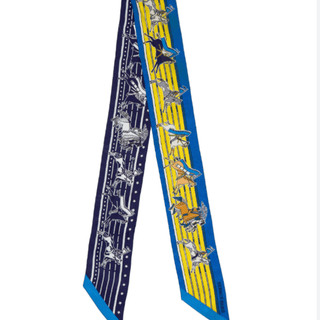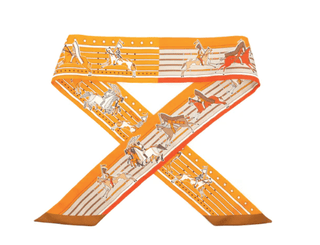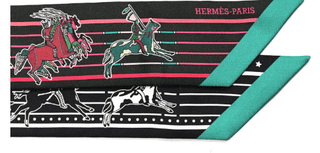Hermes Twilly fashioned form the Kermit Oliver original scarf design: Pani la Shar Pawnee
100% silk Made in France
Condition: As-Is. Contact us for details on each scarf. Photos representative and may not depict our exact availability.
Pre-loved, original sewn in tag has been removed.
Size: 5 x 86 cm
The story behind
This portrait is a tribute to the Pawnee, a tribe from the Nebraskan and Kansan plains that was forced into exile in the Indian Territory of Oklahoma at the end of the 19th century. Sumptuously dressed, Pani La Shar Pawnee holds a sculpted peace pipe featuring a galloping horse. His calm gaze and proud bearing express the great dignity of his people. Peace pipes and bison heads decorate the corners of this composition, around which run horses and their riders inspired by Karl Bodmer's notebooks. The work of this 19th-century illustrator remains a precious record of Native American culture. Pani La Shar Pawnee, designed in 1984, was the first scarf imagined by Kermit Oliver.
Hermes Twilly fashioned form the Kermit Oliver original scarf design: Pani la Shar Pawnee
100% silk Made in France
Condition: As-Is. Contact us for details on each scarf. Photos representative and may not depict our exact availability.
Pre-loved, original sewn in tag has been removed.
Size: 5 x 86 cm
The story behind
This portrait is a tribute to the Pawnee, a tribe from the Nebraskan and Kansan plains that was forced into exile in the Indian Territory of Oklahoma at the end of the 19th century. Sumptuously dressed, Pani La Shar Pawnee holds a sculpted peace pipe featuring a galloping horse. His calm gaze and proud bearing express the great dignity of his people. Peace pipes and bison heads decorate the corners of this composition, around which run horses and their riders inspired by Karl Bodmer's notebooks. The work of this 19th-century illustrator remains a precious record of Native American culture. Pani La Shar Pawnee, designed in 1984, was the first scarf imagined by Kermit Oliver.







